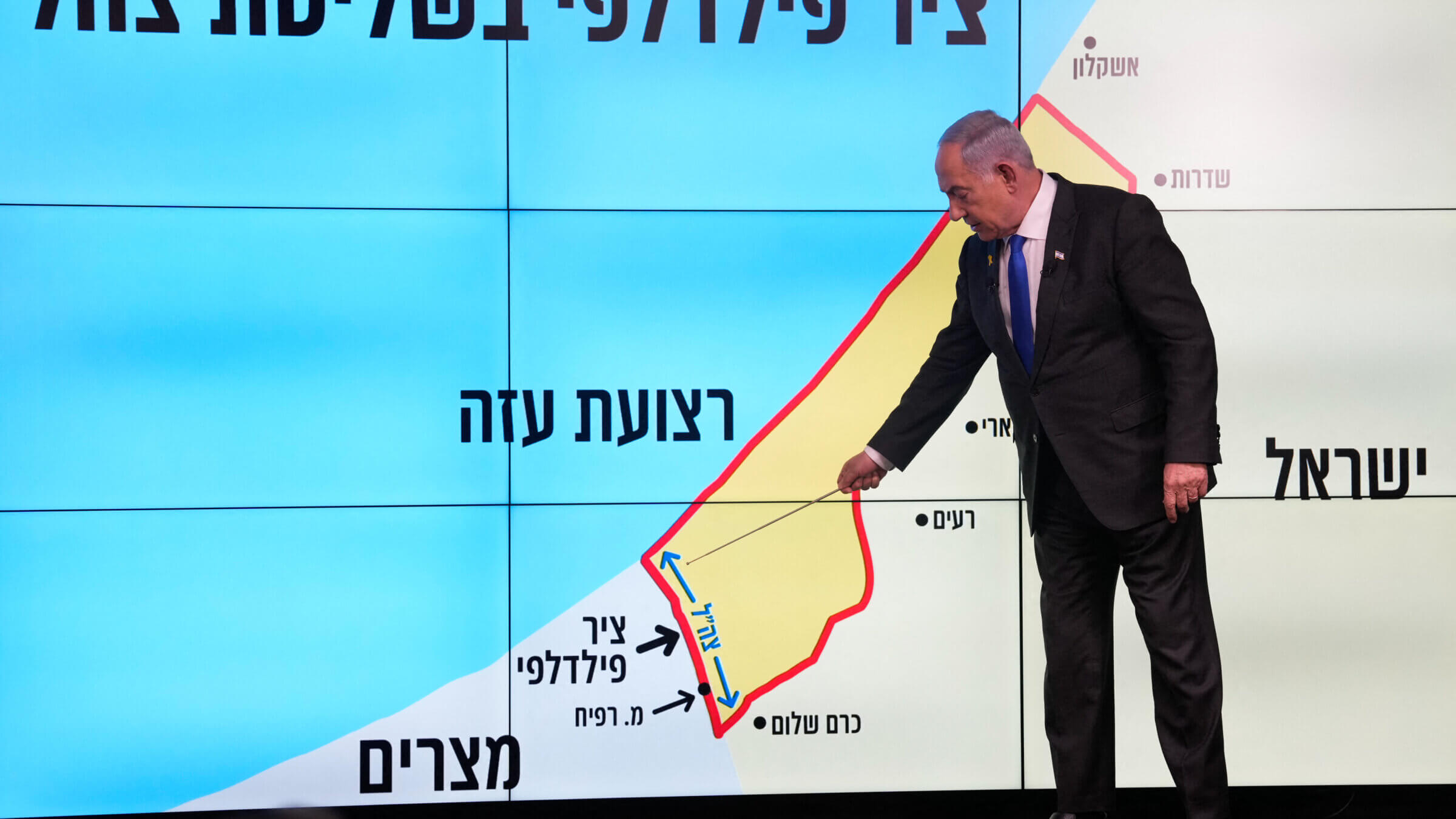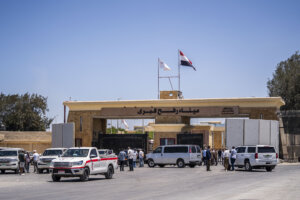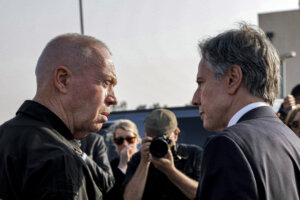What is the Philadelphi Corridor, and why is it such a big deal to Netanyahu?
The border between Gaza and Egypt is increasingly seen as a barrier to returning the hostages

Israeli Prime Minister Benjamin Netanyahu stands before a map of the Gaza Strip, telling viewers that Israel must retain control over the “Philadelphi corridor,” a strategic area along the territory’s border with Egypt. Photo by Ohad Zwigenberg / POOL / AFP
The future of the Philadelphi Corridor — an 8-mile strip of land along Gaza’s border with Egypt — has emerged as a sticking point in Israel’s ceasefire negotiations with Hamas. Prime Minister Benjamin Netanyahu has insisted that Israel maintaining control over the corridor is central to its national security. But Hamas has made clear that any deal to release the hostages is conditioned on full Israeli withdrawal from Gaza — which includes Philadelphi.
In the meantime, outrage over the discovery this weekend that Hamas had executed six Israeli hostages nearly 11 months after their abduction led to the largest protests against Netanyahu since Oct. 7, and to open dissent within his war cabinet. The mother of Almog Sarusi, one of the six, hostages, said at his funeral that he had been “sacrificed on the altar” of the Philadelphi Corridor.
Until a few months ago, that corridor was Gaza’s only bridge to the outside world not under Israeli control. Here is its backstory.
How Philadelphi came to be (and got its name)
Only a few hundred yards wide and barren of construction beyond fences on either side, the corridor was established when Israel disengaged from the Gaza Strip in 2005, withdrawing both soldiers and settlers that had occupied the area since the 1967 war. Under an addendum to the Camp David accords — the 1978 peace treaty between Israel and Egypt — known as the Philadelphi Protocol, it was to serve as a buffer between Gaza and Egypt.
The name “Philadelphi” was what the road along the border was called on Israeli military code maps, former IDF spokesperson Jonathan Conricus said in a recent Israeli TV interview. Palestinians and Egyptians call it Salah Al Din. This road leads to the Rafah Crossing, which is controlled by Egypt — Gaza’s only entry or exit point not controlled by Israel.
The Philadelphi Protocol stipulated that Egypt would deploy hundreds of border patrol officers along the corridor to prevent smuggling. The Palestinian Authority would control it from the Gaza side.
But Israel soon started finding tunnels under the corridor. In 2006, the Israel Defense Forces demolished 13 tunnels it said had been used to smuggle weapons into Gaza. The problem worsened after Hamas ousted its rival Fatah faction from Gaza in a bloody coup in 2007, wresting control of the strip from the P.A.
In 2014, after a pair of terror attacks in the Sinai desert near Gaza, the Egyptian government demolished hundreds of houses to widen the corridor to 500 meters, as it was rumored that the terrorists may have used the smuggling tunnels to enter the country or transport explosives.
The IDF took control of the corridor in May, and shortly afterward announced that it had discovered 50 tunnels underneath it connecting Gaza to Egypt.
Why Netanyahu won’t give up Philadelphi
The prime minister has said that these tunnels made the Oct. 7 attack possible.
“It became a huge terrorist base because we left that corridor,” he said at a Wednesday news conference.
In May — seven months into the war — IDF forces surged into the corridor, defying Egyptian officials who said the action violated their sovereignty. Israeli troops have remained there since, and Netanyahu calls their ongoing presence there a “red line” in ceasefire negotiations.
He said Wednesday that proposals to leave Philadelphi temporarily would enable Hamas to smuggle the remaining hostages out of Gaza and into Sinai or Iran. The international community would never support Israel retaking the corridor down the road, he argued, inevitably creating the same conditions that led to Oct. 7.
Many in Israel have suggested that the six hostages whose bodies were discovered in a tunnel under Rafah may have been murdered in response to Netanyahu’s cabinet voting on Thursday to hold fast to Philadelphi. But Netanyahu now says caving on the corridor after the killing of hostages would be akin to rewarding terrorism.
“People said, ‘Yeah, but if you stay, this will kill the deal,’” the prime minister said. “And I say: Such a deal will kill us.”

What Netanyahu’s critics are saying
With ceasefire negotiations dragging on for months, Defense Minister Yoav Gallant and a slew of unnamed Israeli officials have slammed Netanyahu for his obstruction, saying he was overstating Philadelphi’s significance. And as large swaths of the Israeli public took to the streets this Sunday and Monday, Netanyahu’s fixation on Philadelphi has become the center of their fury.
Some have pointed to the Israeli military’s seeming deprioritization of Philadelphi during the war’s early stages as evidence that the corridor is not as critical as Netanyahu says. (Others maintain it should have been pursued sooner.) A New York Times article says that Netanyahu himself only added it to his list of demands in July.
Gallant called Netanyahu’s prioritization of Philadelphi over the hostages “a moral disgrace,” according to Israeli news outlets. Former IDF Chief of Staff Benny Gantz, who quit Netanyahu’s war cabinet in June, has said the corridor is important but should be abandoned until the remaining hostages — an estimated 95, 60 of whom are believed to be alive — are returned.
The rest of Netanyahu’s security cabinet has backed the prime minister.
Why don’t the Palestinians and Egypt want Israel in the corridor?
Hamas is not alone in rejecting Israeli control of the corridor. Egypt, which along with the United States and Qatar is key in brokering any agreement, also wants the IDF out.
Palestinians and their allies see any ongoing Israeli presence in the corridor as a military occupation of Gaza in violation of international law. It would also shut off their only border not controlled by Israel. And it would threaten the tunnels, which are not only used for weapons, but also food and other goods.
“Without withdrawing from the Philadelphi corridor, there will be no agreement,” Khalil al-Hayya, Hamas’s lead negotiator, said Monday in an interview with Al Jazeera.

Egypt sees Israel’s presence there as a violation of the Philadelphi Protocol — and thus, the Camp David Accords — and it maintains that it is managing the border effectively. It has rejected Israel’s proposal of putting eight guard towers along the corridor.
It’s perhaps no surprise that the broader Arab world has taken their side. But it seems the Biden administration has as well, by saying that any ceasefire agreement would involve a full withdrawal of Israel from Gaza.
While Biden said Monday that Netanyahu is not doing enough to end the war, the president has not addressed Philadelphi directly. On Wednesday, an unnamed White House official did so, characterizing Netanyahu’s hardline stance on it as disruptive.
“We have taken account of Israel’s security concerns in this negotiation,” the official said, “and if anything, not getting into this deal is more of a threat to Israel’s long-term security than actually concluding the deal and that includes the issue of the Philadelphi corridor.”
Are there any other options for resolution?
Recent reports from the negotiating table are that Netanyahu has appeared open to the idea of withdrawing troops from the corridor in a second phase of a ceasefire deal.
The U.S. has also proposed putting international forces there for six months, with U.S. and the Palestinian Authority — but not Hamas — posted at the Rafah crossing. But the White House official who spoke anonymously on Wednesday said that an “alternative security force” wouldn’t be necessary for securing the Philadelphi Corridor.
And he noted that Netanyahu’s corridor demand has hardly been the only obstacle to a deal. Hamas, the official said, has made the negotiations “a pretty frustrating process.”
“What Hamas has been demanding here,” they said, “the Israelis have come forward to meet the terms as best they can.”

















